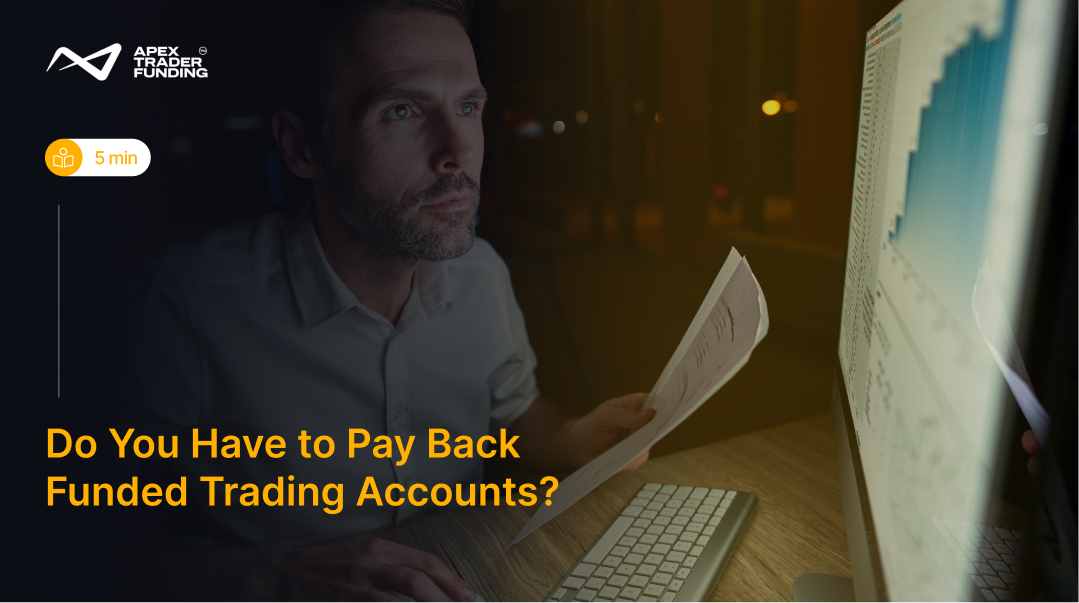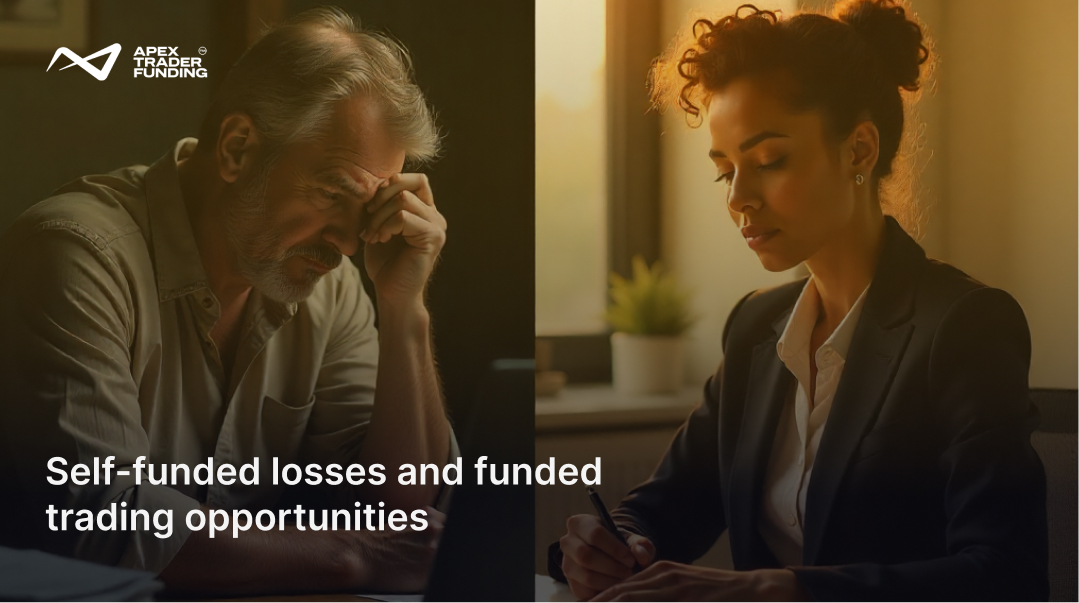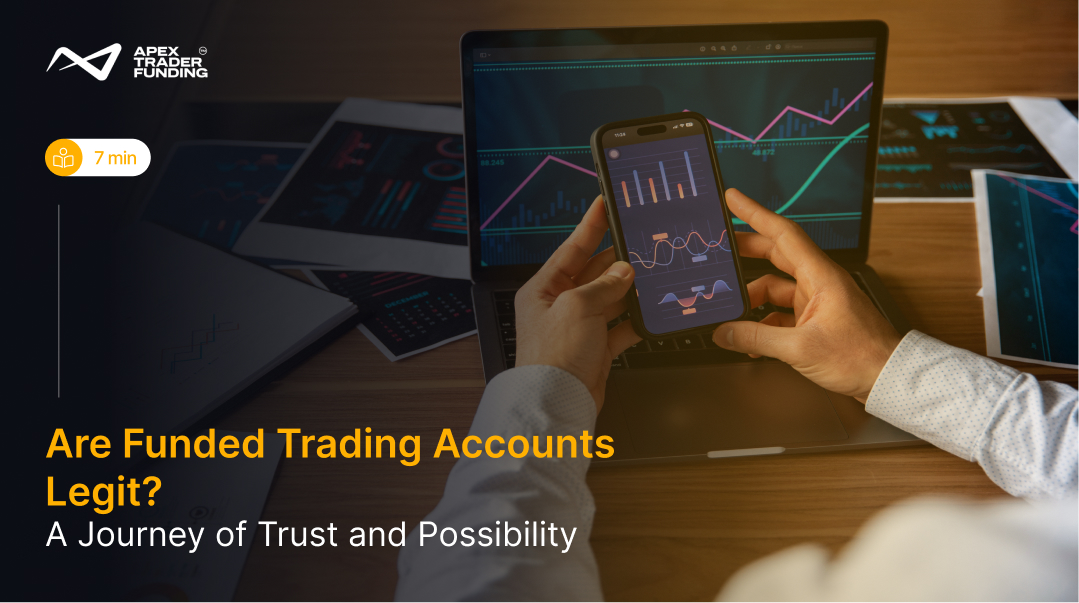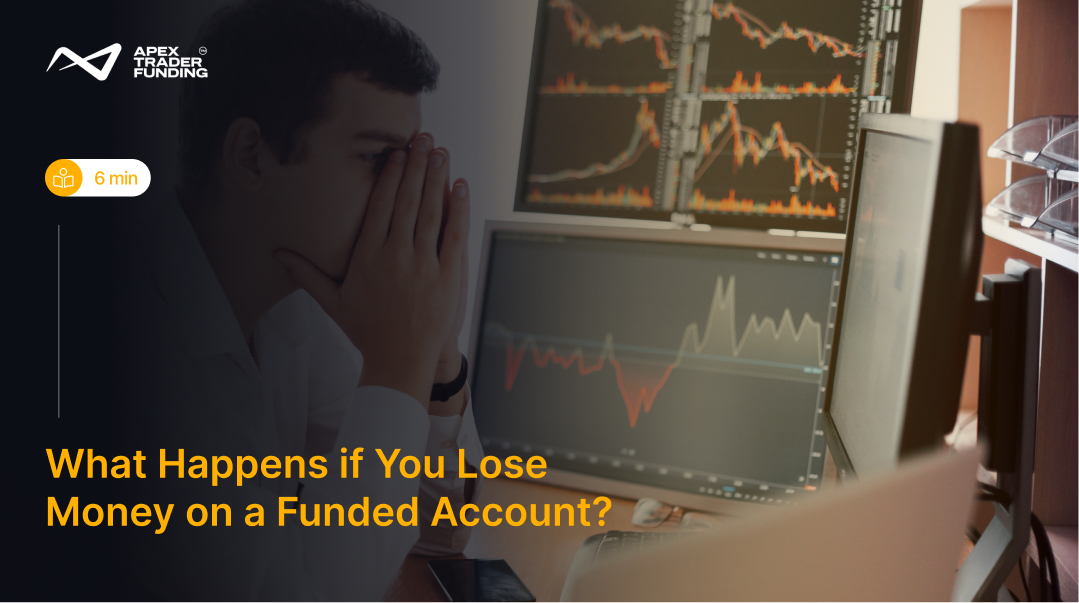
trading-inspiration | 29-08-25
You are never personally liable for trading losses in a funded account because you are technically an independent contractor trading the firm's simulated or live capital. The firm manages its risk via an automated trailing drawdown; if you hit your loss limit, the account is simply closed. Your only financial risk is the initial evaluation fee.
One of the biggest concerns new traders have when they hear about funded trading accounts is simple: “If I lose, will I owe money back?” The thought of trading with someone else’s capital can feel intimidating, as though a misstep could put you into debt. The reality, however, is far more encouraging.
The purpose of funded accounts is to encourage progress, not to intimidate traders. The idea is to give motivated traders the chance to prove their skills without the crushing weight of personal financial risk. Understanding how repayment really works can remove hesitation and help traders step into opportunities with confidence.
Contractor vs. Borrower: The Legal Distinction
It is important to understand your legal standing: You are a service provider (independent contractor), not a borrower. When you trade a funded account, you are not taking out a loan. Because there is no debt instrument or credit agreement, there is no "principal" to pay back. This distinction is the single most important reason why personal liability does not exist in this model.
What Happens When Losses Occur?
In most funded account setups, traders are not personally responsible for covering losses. The firm absorbs the downside risk because they know losses are part of trading. Instead of paying money back, the trader’s evaluation ends, or the account is closed when limits are breached.
This arrangement isn’t a loophole—it’s the design. By shielding traders from direct financial loss, funded accounts let them focus on discipline, strategy, and consistency. The real “cost” isn’t in cash but in accountability: following the rules that keep the opportunity alive.
Trading with firm-backed capital isn’t about debt—it’s about proving discipline in a structured environment.
The Inspirational Trade-Off
The beauty of funded trading is that the journey is built on trust and structure. The firm trusts you with their capital, but in return, you commit to respecting their boundaries. That exchange creates a unique motivation—mistakes don’t sink your bank account, but they do test your habits and mindset.
The motivation lies in knowing that even mistakes push you ahead—each loss becomes a lesson, every test an opportunity to improve, and every rule a reminder that trading is built on persistence rather than quick wins.
Why “No Repayment” Is Powerful
Knowing you don’t owe money back changes how you approach the markets. Instead of trading with fear, you trade with clarity. This environment:
- Encourages experimentation without reckless gambling.
- Promotes resilience after mistakes.
- Allows traders to focus on building habits instead of worrying about debt.
The result? Traders are free to think long-term. They can build strategies step by step, rather than chasing quick wins to “cover” imaginary liabilities.
Tax Implications (2026 Update)
Because you do not own the underlying capital, the tax treatment differs from a personal brokerage account. Since you are not personally liable for losses, you cannot claim Capital Losses on your taxes for blown accounts. However, there is a silver lining: you can often deduct Evaluation and Reset Fees as legitimate business expenses. Note: Tax laws vary by jurisdiction; always consult a qualified tax professional regarding your specific situation.

Rules vs. Repayment: How Funded Accounts Protect Traders
Funded accounts don’t expect traders to cover firm losses out of pocket because rules are built in to control risk. These safeguards replace the need for repayment by ensuring losses never spiral out of control.
Rules replace repayment—limits and consistency checks protect both trader and firm.
"The firm doesn't ask for repayment because they use a 'Safety Net' model. For instance, on a 25K account, Apex's risk is limited to the $1,500 trailing threshold.
This means the firm never actually risks the full $25,000 on an unproven trader. This automated 'kill-switch' is the legal and technical reason why personal debt is impossible in this business model."
Comparison: 25K Evaluation Accounts
A Story of Perspective
Imagine two traders facing the same loss. The self-funded trader feels the immediate financial hit, questioning whether they can even continue. The funded trader, on the other hand, sees the account close but walks away with lessons and no debt. One is set back financially; the other is set up to try again with stronger insight.
That difference—between financial burden and educational opportunity—is what makes funded trading such an inspiring pathway for those serious about growth.
The Inspirational Takeaway
So, do you have to pay back funded trading accounts? The answer is no—you don’t owe debt when losses occur, as long as you respect the rules. What you give in return isn’t money, but commitment—steady effort, discipline, and the ability to learn from setbacks.
For traders who dream of stepping into the markets without the fear of financial ruin, this model proves that opportunity doesn’t always have to come with heavy risk. It shows that progress is possible, not by avoiding failure, but by embracing a system that turns discipline into your true currency.
Ready to Take the Next Step?
If you’re inspired to explore structured trading, Apex Trader Funding offers evaluation programs designed to build discipline. You can begin with a 25K Rithmic account or a 25K Tradovate account, depending on your preferred platform.
FAQs
You can keep a funded account indefinitely as long as you follow the firm’s rules and maintain the required performance standards. There’s no set time limit—your access continues as long as the account stays in good standing.
Yes, most funded trading accounts require an upfront fee to join an evaluation or challenge. This fee covers access to the account, trading rules, and platform integration. It’s not repayment of losses—rather, it’s the cost of proving your skills before gaining live capital.
The share of profits depends on the firm’s payout structure. In most cases, traders keep the majority—often 70% to 90%—while the firm keeps a smaller percentage for providing the capital. The exact split varies, but the goal is to reward consistent performance.
Yes, withdrawals are allowed once trading profits meet the firm’s payout rules. Most providers set a minimum profit threshold or payout cycle—such as monthly or bi-weekly. Traders can then request their share of profits, while the firm retains its portion. The exact withdrawal terms differ by firm, so traders should always review payout schedules before starting.
Related Blogs

trading-inspiration | 24-08-25
Are Funded Trading Accounts Legit or a Scam?
In the last decade, a new question has captured the curiosity of traders worldwide: Can you really trade with someone else’s...
Read more
trading-inspiration | 05-09-25
What Happens if You Lose Money on a Funded Account?
Every trader dreams of gaining access to more capital. Funded accounts make this possible, offering a chance to trade larger...
Read more
trading-inspiration | 08-09-25
How to Become a Funded Trader? - Step by Step Guide
Every trader begins with the same dream: managing larger capital and unlocking greater opportunities. For many, limited personal savings make...
Read more